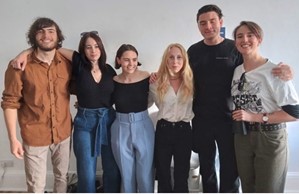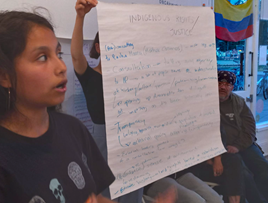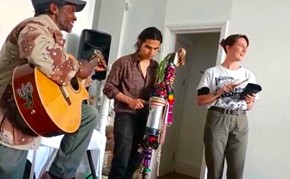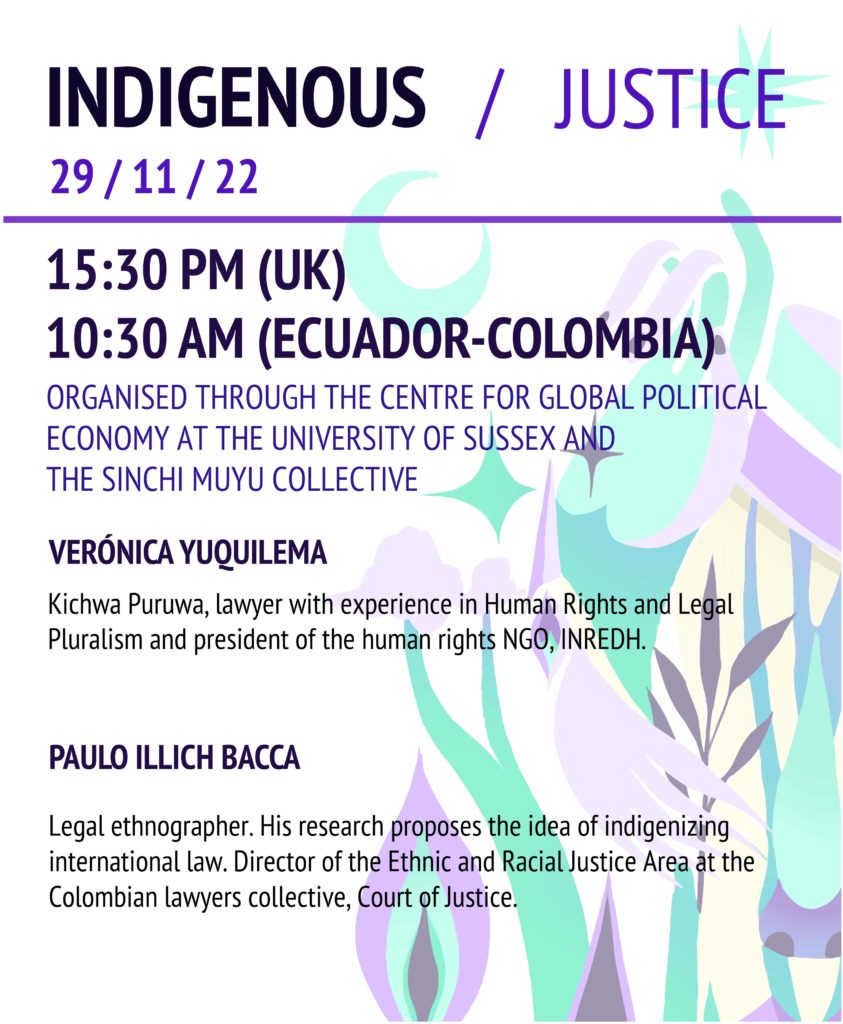write Global Studies students Helena Müllenbach Martínez and Lotte Jaeger
*The views in the following article are the personal views of the author and are not an official position of the School.*
When taking the final year module on Global Resistance, I was particularly looking forward to the unit on ‘Strategic Use of Law.’ I had spent the previous year working as a research assistant on a project run by the Global Resistance convenor Lara Montesinos Coleman, interviewing grassroots social movement organizers in Colombia, where I come from, about what it meant to use law strategically against the plunder caused by transnational corporations. We spoke about the extent to which using litigation could be a useful tool in their struggle for justice, but also about the law’s (many inherent) limitations for addressing systemic forms of harm, with their roots in colonialism.
For instance, the Yukpa Indigenous people, located in the Serrania del Perija in northern Colombia, are at the frontline of resistance against extractivist megamining companies such as Drummond and Glencore. The contamination from megamining projects in their territories has resulted in the death of over 42 Indigenous children between 2018 and 2019, due to malnutrition, as well as a loss of territory of 10,000 hectares of ancestral land. Water sources, that are essential for the survival of the Yukpas, continue to be cut off by the mining activities of various Western multinationals.
In February 2022, the UCU strikes were in full swing and most of our classes at university got cancelled. We were lucky that, from the first day of the Global Resistance class, ‘community’ was at the forefront of learning. Having been encouraged to form study groups, our seminar group repeatedly got together to discuss how we could collectively build transformative movements, and we felt empowered to organize our own campaign building on our Global Resistance module discussions. The week before we graduated, we invited a broad range of activists and climate justice movements to join a public event and workshop, entitled ‘Resisting Killer Corporations: Strategic Use of Law against Extractivism’, at Brighton’s ONCA gallery, with the support of the Centre for Global Political Economy and the School of Global Studies, via the Higher Education Impact Fund, collaboration with War on Want and with Yukpa, in Colombia.
As students, we discussed how the ‘rule of law’ is often immensely distant from justice. While I was in Colombia, lawyers told me that ‘despite [my] profession [I] do not believe in the law’1. Community organizers explained how ‘if the struggle remains in the judicial realm alone, you are doing a great favour to the corporation’2, as the power rooted in a larger unified social movement becomes essential when the use of litigation alone fails. This raises the question discussed at the workshop and in Coleman et al.’s book Righting Corporate Wrongs: when justice is being sought in a framework that has been built in the interests of capital rather than the people, can formal litigation ever help unveil and dismantle the violent forces beneath it? The book, which was co-produced with social movement leaders and lawyers in Colombia, describes how the corporation itself is a structural form of impunity, but also observes how social movements ‘use legal activism, not just to achieve remedy or protect legally-defined rights, but in the context of struggles for alternatives to capitalism/neoliberalism/neocolonialism’ (Coleman et al, 2019:42). The book also proposes the use of ‘strategic litigation’.
This possibility of using the law strategically whilst being aware of its inherent limitations allows us to create a campaign in solidarity with the Indigenous Yukpa community in Colombia, which we launched after the workshop.
Currently, the Yukpas are about to file a claim with the Constitutional Court, which is highlighting how extractivist practices have resulted in the physical and cultural genocide of their people. Multinationals such as Prodeco/Glencore and Drummond have created ‘zones of security’ that subsidize Colombian paramilitary squads in the area, making judicial or social resistance extremely dangerous for the community.
Nevertheless, the Yukpa’s resistance remains strong. Esneda Saavedra, the governor of the Yukpas, explained how “[We] maintained an Indigenous Guard. The paramilitaries wanted to disappear the Yukpa peoples, but we had a strong resistance; if they touch one Yukpa, they touch us all. We fight with a force that is spiritual, as well as with our bows and arrows. (…) Our ancestral knowledge will never be forgotten; it will always be there and they will never invade our minds. This knowledge is the biggest protection for our territory, and it will always be ours”3.
The Yukpa’s legal action highlights the massive discrepancy between the judicial rights of Indigenous peoples and their implementation. Despite their rightful use of the ILO’s 169 convention, which is meant to guarantee Indigenous peoples’ right for previous, free and informed consultation for extractivist projects in their territories, members of the community recall how “[We] were never consulted. They come to consult us when the damage is done. They diverted the river, it used to be a river for fishing, now there are no fish but sardines. They took that away from us, they diverted it, did whatever they wanted with the river”4.
Whilst mining activities in Colombia might feel far away, we are far from disconnected from the struggle of the Yukpas. Not only are the headquarters of these of multinational corporations, such as Glencore and Drummond, located just outside our doorstep, but we are also daily consumers of products made with the oils and minerals Glencore extracts from Indigenous lands. Most fundamentally, however, we all share the same home: We all live on, though, and from the same earth, which is a sensitive and fragile organism in itself, and whose destruction at one place has devastating consequences for its overall balance and thus, the wellbeing and survival of its inhabitants everywhere.
Based on this inherent interconnectivity and co-dependence, the Yukpas extend an invitation: “Today, Indigenous peoples have a legacy in the world, and from the Yukpa world we can say that we want to invite all those people to join in the territorial defence. Our mother nature has life, and we must take care of her, we must respect her, and this what I invite you to do”5. Thus, our aim is to fight hand in hand with the Yukpas, in order to hold Glencore accountable.
We have teamed up with people that are directly connected to the struggle such as Edward Alvarez, a Colombian sociologist that has assisted the Yukpa community for over 20 years, and Francisco Ramirez Cuellar, the lawyer that is supporting the anti-colonial strategic litigation that will be put forth by the community. We will work with the community directly, as well as organizations such as HumanConet, a Colombian-based NGO which creates audiovisual material of the resistance and runs various campaigns with the communities. The network of this strategy is ever expanding, as we seek to base our actions on the demands of the communities at the frontlines.
Our launch event for the campaign began with Colombian Cumbia music, as one of the reasons why Colombian resistance is so powerful is that it is rooted in collective joy. It was followed by an inspiring panel of speakers: we learnt from Lara Montesinos Coleman, about the possibilities and pitfalls of the strategic use of law to challenge the pervasive harm caused by the extractivist operations of multinational corporations. She was followed by Gilberto Torres, a former Colombian Union Leader who survived a brutal abduction and torture by paramilitaries for his political activities, who is currently exiled in Venezuela. Gilberto’s court case against BP in 2012 highlighted some of the limitations of litigation, as the respective judges concluded that there was no definite link between the testimonials of paramilitaries, stating that they had been paid by ‘the company’ for Gilberto’s kidnapping, and the conduct of the defendant BP and their Colombian subsidiary OCENSA. Our closing speaker was Sebastian Muñoz, Senior Programmes Officer at War on Want, who spoke about developing justice-oriented approaches to tackle the social and ecological crises, as well as the avenues of hope with the first progressive government in Colombia’s history.
Finally, we facilitated workshops that were divided into themed groups such as ‘Social Movements’, ‘Indigenous Rights’, and ‘Changing Corporate Behaviour’. In the groups formed, we brainstormed about developing a powerful and effective strategy together.
Over 30 people have signed up to take part in the campaign, with the aim of growing our network and develop a viable strategy in cooperation with the Yukpas, fighting for the corporate decolonisation of Indigenous lands, long term reparations, and for global socioeconomic justice.
Alongside the Sussex Centre for Global Political Economy, we have organised this online event on Indigenous justice and we are looking forward to ‘seeing’ you there!
In near future, we will be raising funds to bring Yukpa leaders to the AGM of Glencore, working alongside London Mining Network.
Find out more about our initiatives: hmullenbach@protonmail.com
*******************************************************************************
1Interview with Francisco Ramirez Cuellar, 2020 (my own translation)
2Interview with Felipe Rodriguez, 2020 (my own translation)
3Interview with Esneda Saavedra, the governor of the six Yukpa cabildos, via the Colombian-based NGO Human Conet. For more information visit: https://humanconet.org/en/take-action-yukpa-resist/
4Interview with the members of the Yukpa community filmed and transcribed by the NGO Human Conet (2021)
5Ibid







Leave a Reply